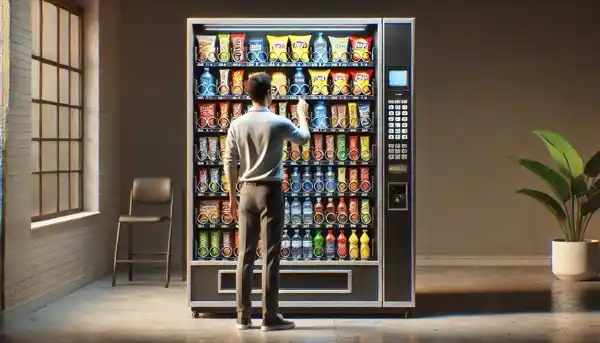Introduction
Hello, aspiring entrepreneurs! John Doe here. If you’ve ever considered starting a vending machine business, you’re in the right place. When I first thought about diving into this vending machine business venture, I was overwhelmed with questions and uncertainties. But now, with years of experience and a few success stories under my belt, I’m here to share what I’ve learned to help you succeed.
Starting a vending machine business can be incredibly rewarding. Think of it as planting a garden; with the right care and attention, it can flourish and provide a steady stream of income. The best part? It’s a business you can start with relatively low initial investment compared to other ventures.
In this guide, we’ll cover everything you need to know about starting a vending machine business. We’ll discuss creating a solid vending machine business plan, finding profitable vending machine locations, maintaining your vending machines, and much more. By the end, you’ll have a clear roadmap to launch your own vending machine business successfully.
Remember, every great journey begins with a single step. Let’s take that step together and explore the exciting world of vending machines!
Crafting Your Vending Machine Business Plan

Creating a robust vending machine business plan is the first step to success. Imagine this as the blueprint for your future vending empire. Without it, you’re navigating without a map, and trust me, the journey will be much smoother with a clear plan.
1. Market Research
Understanding the market is crucial. Start by analyzing the demand for vending machines in your area. Are there specific locations where vending machines are more likely to succeed? Schools, offices, and gyms are often high-traffic areas that can bring in significant profits. Use data and case studies to pinpoint the best vending machine locations for your machines.
2. Initial Investment and Costs
Knowing how much you need to invest upfront is vital. The cost of starting a vending machine business can vary based on the type and number of machines you plan to purchase. From snack and beverage machines to specialized ones like those offering healthy snacks or gourmet coffee, each has a different price tag. Factor in the cost of maintenance and stocking your vending machines regularly.
3. Profit Projections
Your vending machine business plan should include realistic profit projections. How much do you expect to make in the first six months? What about the first year? Consider all variables, including the cost of goods sold, maintenance expenses, and potential downtime. Vending machine business profit is a key factor in ensuring your plan is realistic and achievable.
Remember, the goal is to create a roadmap that guides you from the start-up phase to profitability. A well-thought-out vending machine business plan will not only help you stay on track but also attract potential investors.
Understanding Initial Costs and Revenue Streams

Starting a vending machine business requires a clear understanding of both the initial costs and potential revenue streams. This knowledge will help you make informed decisions and set realistic financial goals.
1. Initial Investment Breakdown
When starting a vending machine business, your initial investment will cover several key areas:
- Purchasing Vending Machines: Depending on the type of machine and its features, costs can range from a few hundred to several thousand dollars. Consider starting with a few machines and gradually expanding as your business grows.
- Stocking Your Machines: The initial inventory cost is another important factor. Whether you’re stocking snacks, beverages, or specialized products, make sure to account for these expenses.
- Licensing and Permits: Check local regulations to understand the licensing and permits required for operating vending machines. These costs vary by location but are essential for legal compliance.
2. Finding Profitable Locations
Choosing the right vending machine locations is critical for success. High-traffic areas with lots of potential customers can significantly boost your revenue. Consider places like:
- Office Buildings: Employees often look for convenient snack and beverage options.
- Schools and Universities: Students and staff are frequent users of vending machines.
- Gyms and Fitness Centers: Health-conscious consumers appreciate quick access to healthy snacks and drinks.
- Hospitals and Healthcare Facilities: Patients, visitors, and staff create a steady demand for vending services.
3. Revenue Projections and Profit Margins
Once your machines are up and running, it’s important to monitor your revenue and calculate your profit margins. Track sales data to understand which products sell best and adjust your inventory accordingly. Aim for a balance between high-demand items and products with higher profit margins.
Regular vending machine maintenance and restocking are essential to keep your machines operational and customers satisfied. A well-maintained machine not only attracts more customers but also reduces downtime and repair costs.
Essential Steps to Start Your Vending Machine Business

Understanding the essential steps to start your vending machine business is crucial. This will help you move forward with confidence and ensure you cover all necessary aspects to make your business a success.
1. Choosing the Right Vending Machines
Selecting the appropriate vending machines is vital. There are various types of machines, each serving different purposes and products:
- Snack Vending Machines: These are perfect for offices, schools, and other high-traffic areas where people look for quick snacks.
- Beverage Vending Machines: Ideal for places like gyms, hospitals, and office buildings.
- Specialty Vending Machines: These can offer products like healthy snacks, gourmet coffee, or even tech gadgets.
Research and decide which type of machine aligns best with your target market and business goals. Understanding the best vending machine types can greatly impact your success.
2. Securing Suppliers
Reliable suppliers are essential for keeping your vending machines stocked with popular and high-quality products. Establish relationships with local and national suppliers to ensure you have a steady supply of inventory. Look for suppliers who can offer competitive prices and flexible delivery schedules. Vending machine suppliers are key to maintaining a successful operation.
3. Setting Up Your Business Legally
To start a vending machine business legally, you need to address several key legal requirements:
- Business Licenses and Permits: Obtain the necessary licenses and permits specific to your location. This might include a general business license, health permits, and vending machine permits.
- Insurance: Protect your business with the appropriate insurance. This can include liability insurance, property insurance, and even product liability insurance.
- Tax Registration: Register your business for tax purposes. This includes obtaining an Employer Identification Number (EIN) and understanding your state and local tax obligations. Understanding vending machine legal requirements will ensure your business operates smoothly.
4. Marketing Your Vending Machine Business
Marketing is crucial for attracting customers to your vending machines. Consider these strategies:
- Online Presence: Create a website and social media profiles to promote your vending services.
- Promotions and Discounts: Offer promotions or discounts to attract new customers and encourage repeat business.
- Partnerships: Collaborate with local businesses and organizations to place your machines in high-traffic areas.
Overcoming Common Challenges in the Vending Machine Business
Starting a vending machine business comes with its own set of challenges. By being aware of these potential obstacles and having strategies to overcome them, you can set yourself up for success.
1. Finding the Right Locations
One of the biggest challenges is finding profitable vending machine locations for your machines. High-traffic areas are key to generating sales, but securing these spots can be competitive.
- Solution: Conduct thorough research to identify the best locations. Visit potential sites, observe the foot traffic, and negotiate placement agreements with property owners. Consider offering a percentage of profits or a flat fee to secure prime locations.
2. Initial Capital and Funding
Securing enough initial capital to purchase vending machines and stock them can be daunting.
- Solution: Explore various funding options such as personal savings, loans from family and friends, small business loans, or crowdfunding. Create a detailed business plan to present to potential investors or lenders, showcasing the profitability and potential of your vending machine business.
3. Machine Maintenance and Inventory Management
Keeping your vending machines in good working order and managing inventory effectively are ongoing challenges.
- Solution: Develop a regular maintenance schedule to ensure your machines are clean and functional. Use inventory management software to track stock levels and sales data, helping you replenish items before they run out. Consider hiring a technician for routine checks and repairs.
4. Standing Out in a Competitive Market
With many vending machines offering similar products, differentiating your business can be challenging.
- Solution: Offer unique and in-demand products that cater to your target audience. Consider stocking healthy snacks, organic beverages, or locally sourced items. Customize your vending machines with attractive designs and branding to draw attention. Engage with your customers through social media and loyalty programs.
5. Navigating Legal and Regulatory Requirements
Compliance with local laws and regulations is essential but can be complex.
- Solution: Stay informed about the legal requirements for vending machine businesses in your area. Consult with a legal expert to ensure you have all necessary licenses and permits. Keep up-to-date with any changes in regulations that might affect your business.
FAQ
Frequently Asked Questions about Starting a Vending Machine Business
1. How much initial capital is needed to start a vending machine business?
The initial capital required depends on various factors such as the type and number of vending machines you plan to purchase, the cost of stocking them, and any licensing fees. Generally, you can start with a few thousand dollars to cover these initial costs. It’s important to create a detailed budget and consider all expenses, including maintenance and potential repairs.
2. What are the most profitable locations for vending machines?
Profitable locations are those with high foot traffic and a steady stream of potential customers. Some of the best spots include office buildings, schools, universities, gyms, hospitals, and busy retail areas. Conduct thorough research and visit potential sites to observe traffic patterns and identify the best opportunities.
3. What types of products should I stock in my vending machines?
The products you stock should cater to the preferences of your target audience and the specific location. Common options include snacks, beverages, and healthy snacks. It’s a good idea to diversify your offerings and include popular and high-demand items. Regularly review sales data to adjust your inventory based on what sells best.
4. How do I maintain my vending machines and manage inventory effectively?
Regular maintenance is crucial for keeping your vending machines operational and attractive to customers. Develop a maintenance schedule that includes cleaning, restocking, and addressing any technical issues. Use inventory management software to track sales and stock levels, ensuring you always have popular items available and reducing the risk of running out of stock.
5. What legal requirements should I be aware of when starting a vending machine business?
Legal requirements vary by location, but common necessities include obtaining a business license, health permits, and specific vending machine permits. Additionally, you may need to register for taxes and obtain insurance coverage. It’s essential to consult with a legal expert to ensure you comply with all local regulations and stay updated on any changes in the law.
Related Resources
To help you further on your journey of starting a vending machine business, here are some valuable resources:
- Small Business Administration (SBA): Provides information on business planning, funding options, and legal requirements.
- National Automatic Merchandising Association (NAMA): Offers resources, training, and networking opportunities for vending machine operators.
- VendingMarketWatch: A comprehensive source of news, trends, and best practices in the vending industry.
- Entrepreneur’s Guide to Starting a Vending Machine Business: Detailed guide covering everything from initial setup to scaling your business.
- Vending How: A resource for learning about different types of vending machines, locations, and product selections.